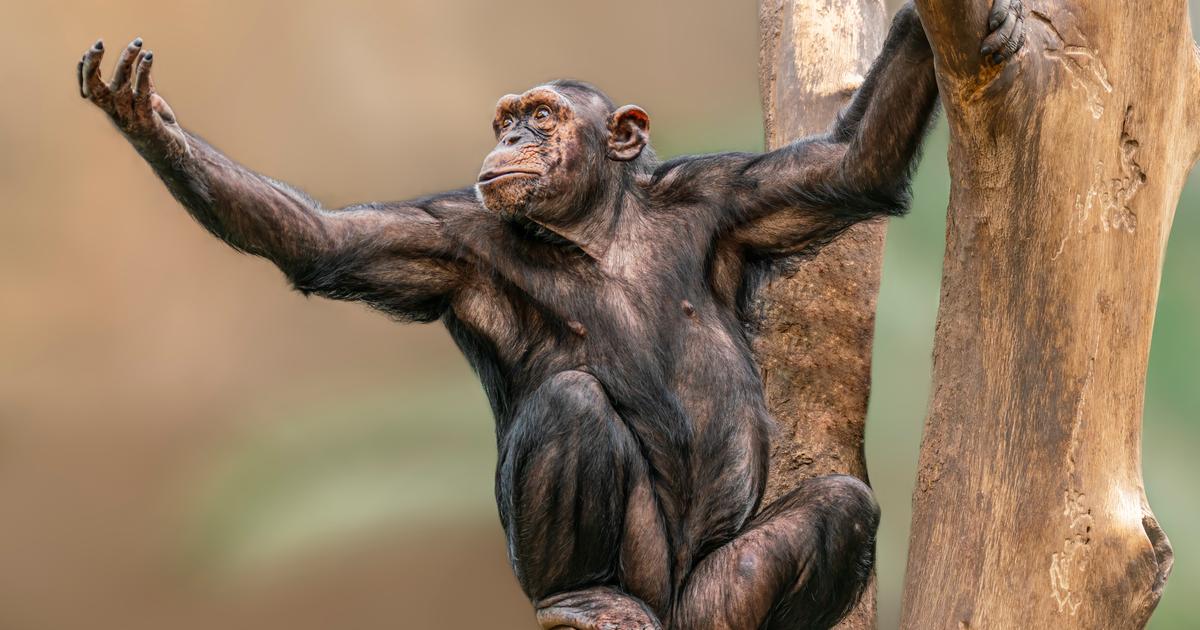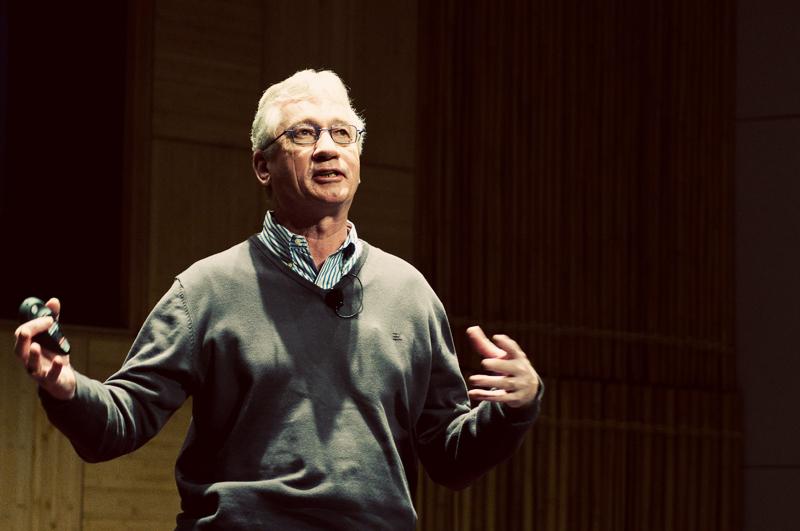Ladies and gentlemen, with you Peter Singer.
This is the man who has convinced half the planet that animals feel and suffer pain, the philosopher who has pushed some Parliaments to legislate on animal welfare, the bioethicist who has become a benchmark of moral thought in the world.
Here is a penetrating and audacious mind that has not hesitated to defend euthanasia in cases where the child is born with malformations and unbearable pain, despite how bad that sounds to the superficial observer, a species increasingly common in our times of sharp phrases and obtuse ideas.
Singer, born in Melbourne (Australia) 75 years ago, is a wide-ranging ethical and political philosopher, although above all he is known as one of the founders of the animal rights movement.
We are not here, however, before a narrow-minded activist who cares more about the welfare of animals than that of their fellow humans.
His all-encompassing intellect wouldn't allow that simplicity.
Neither does his personal history.
The son of Viennese Jews who had to rush to Australia in 1938, he has had to live with the Holocaust etched in his biography: three of his four grandparents were murdered in Nazi concentration camps shortly after his parents left the european hell.
His animalism is a genuinely intellectual stance, not the whim of a citizen bored with his fellow man.
The book that launched him to philosophical stardom was
Animal Liberation: A New Ethic for Dealing with Animals
, published in English in 1975. He has been teaching bioethics at Princeton University for 23 years.
These days he publishes in Spanish an adaptation of
El asno de oro
, from Apuleius, a Roman philosopher who already felt a deep empathy for animals in the second century of our era.
He will also see the Spanish edition of
The Rights of Apes published shortly.
We chat by videoconference about the latest advances in the neuroscience of consciousness, which show that this quality that we believed exclusively ours, the pinnacle of creation, is not located in the front part of the brain, which is the one that has grown the most during evolution. human, but in rear areas that we share with animals.
I ask him if he sees this as confirmation of his theories, and he replies, “Yes, I think consciousness goes way back in Earth's evolutionary history.
Its presence has been confirmed in other mammals, and I think in all vertebrates, including fish, and even in certain invertebrates.
We have all seen the now famous documentary about the octopus,
What the octopus taught me,
which has shown people that octopuses are also conscious beings, even though their consciousness has evolved independently of ours.
All the evidence that we are accumulating in neuroscience shows that consciousness is not a phenomenon specific to humans, not even to primates, but that it comes from much further back in evolution”.
The philosopher admits that our unity with the animal world has been a line of scientific thought since at least the 19th century.
“Darwin recognized that we are not a separate creation, a very important point, because in religious texts, such as the literal reading of Genesis, humans are a direct creation of God, the only ones made in his image and likeness, the only ones that they have an immortal soul that survives the body, and many people, Aquinas for example, interpreted that as a denial that we have obligations to animals.
We would only have them with other beings that have immortal souls, and those are just us, humans.
But Darwin showed that this is a fallacy, since we are not made in the image of God, but rather we are the product of evolution from other animals.
That is Darwin's fundamental insight.
We are not the masters of the animals, we simply live on the same planet as them, and we have no right to assume that our pains and pleasures are unique or different from theirs.
In fact, Hinduism and Buddhism do not see as sharp a division between humans and other animals as Christianity does."
There are thinkers—perhaps the vast majority—who do not accept that animals are capable of suffering.
Singer grows impatient with them.
“In a philosophical sense, we cannot be sure that animals suffer and feel pain.
Solipsism is a difficult position to refute.
Since I suffer, I can be sure of my pain, but I can't be sure of yours.
Although this idea is difficult to refute, however, it does not seem plausible to me.
We see the same pain reactions in animals as in people, and based on the same nervous phenomena.
An aspirin or paracetamol relieves pain in humans and animals alike.
The proposition that they are unaware of their suffering is implausible."
“I would eat a hamburger made from stem cells if no animals had suffered in the process”
Singer is a vegetarian, so here's my favorite question for vegetarians.
Would you eat a stem cell burger?
“I would eat a hamburger made from stem cells if no animals had suffered in the process.
I am not a vegetarian because I reject a type of cell, but because of the pain it causes to obtain them.”
One concern of scientists is that the animal movement could hinder experiments with laboratory animals, which are now essential to research on human health.
Singer clarifies: “I do not share the position of any animal rights group that considers that animal experimentation is always unjustified.
I am a consequentialist, I judge what is right or wrong by its consequences.
But when I examine animal experiments I find a large number that are not necessary for human health or survival.
For cosmetics, for example, or to test food dyes.
There is a hypothesis that links the tendency to post-traumatic stress to the suffering that that person experienced as a child, and it is being demonstrated with animals”.
Something that involves making an animal suffer to see if that increases its tendency to suffer that kind of stress.
"I think there would be other, better ways to help people with post-traumatic stress."
Singer, however, does not qualify his rejection of the fight at all.
“Bullfights can be considered heirs to the games of classical Rome, where beasts ate gladiators and Christians.
It is incredible to me that the bulls have survived to this day, despite the general rejection that public entertainment is based on inflicting suffering on animals.
It is a peculiar tradition, and there are so many other ways to have a party, with all those magnificent football teams you have in Spain and so many people who enjoy watching them, that I would recommend football over bullfighting”.
The philosopher Peter Singer, photographed on June 21, 2017.Alletta Vaandering
I interviewed Singer more than 20 years ago.
I remember that I arrived at the meeting looking like a fighting cock, with supposedly insightful questions like: humans have invented human rights, shouldn't monkeys invent theirs?
We weren't even a minute into the interview when I realized how wrong she was.
It was obvious that Singer was a deep, reflective thinker, and not the grass-eating loudmouth I had imagined.
I dare, however, to repeat one of the questions I asked you then: should computers have human rights?
“Someday they must have them,” he replies, “but the truth is that we are no closer to that day now than we were 20 years ago.
Despite all the advances in artificial intelligence and computing in these 20 years, we still do not see prospects for a conscious machine,
one capable of suffering and enjoying life.
True, 25 years ago we didn't have a computer that could beat the human champion at chess and now we do, they even beat us in more complicated games like Go.
There have been great advances, albeit in very limited contexts.
But if we are looking for a general artificial intelligence, one that allows us to perceive a mind as flexible as ours, and capable of responding to the world as ours does, it does not yet exist.
Ask me in another 20 years.”
We both laugh at the slim chance of that interview taking place.
Old jokes.
But if we are looking for a general artificial intelligence, one that allows us to perceive a mind as flexible as ours, and capable of responding to the world as ours does, it does not yet exist.
Ask me in another 20 years.”
We both laugh at the slim chance of that interview taking place.
Old jokes.
But if we are looking for a general artificial intelligence, one that allows us to perceive a mind as flexible as ours, and capable of responding to the world as ours does, it does not yet exist.
Ask me in another 20 years.”
We both laugh at the slim chance of that interview taking place.
Old jokes.
"In the present context of the Russian invasion of Ukraine, there is no justification for Russia to go to war, nor has ethical conduct on how to fight a war been respected."
I ask you now to turn to Ukraine: is there an ethic of war?
“There are ethical rules of war, and if they were observed by all parties to the conflict, wars would probably be less heinous than they are.
There is an ethic of when to go to war and one of what can be done once you have gone.
But if the question refers to the present context of the Russian invasion of Ukraine, there is no justification for Russia to go to war, nor has ethical conduct been respected on how to fight a war."
I ask you to compare this conflict to the war in Iraq, which began with an Allied invasion of the Middle Eastern country.
“I opposed the war in Iraq at the time, I didn't think it was justified, or that George Bush, or Tony Blair for that matter, would have let the international inspectors who were supposed to confirm the existence of weapons of mass destruction in Iraq finish their job. Iraq".
As can be seen, the third member of the trio from the Azores, José María Aznar, has not remained in the memory of even the best informed people in the world.
“Those observers would have established that there was no evidence of weapons of mass destruction.
Bush and Blair were eager to topple Saddam, who was certainly a ruthless dictator, but that fact alone did not justify war.
Lastly, I ask you to take a stand on the controversy over whether or not we should send weapons to the Ukrainians.
“Ukraine has been unjustly attacked by a brutal dictator who does not allow his own population to know the truth.
Anyone who calls what is officially a 'special military operation' a war faces 15-year prison sentences.
Ukraine is a democracy that respects the rights of its citizens, and I think that all countries that support democratic values and international law should support Ukraine, and that includes sending arms to the Ukrainians.
The most difficult question, while the Russian Army is bombing Ukrainian cities, is whether to respond to President Zelensky's request to impose a no-fly zone, because that would involve the NATO countries in the conflict, and that poses a high risk. ”.
You see it.
There is much more in this mind than caricatured monkeys and insolent journalists.
You can follow BABELIA on
and
, or sign up here to receive
our weekly newsletter
.
Exclusive content for subscribers
read without limits
subscribe
I'm already a subscriber



/cloudfront-eu-central-1.images.arcpublishing.com/prisa/2I75T5NCTFFJTDKNAD4SDRCYKM.jpg)





